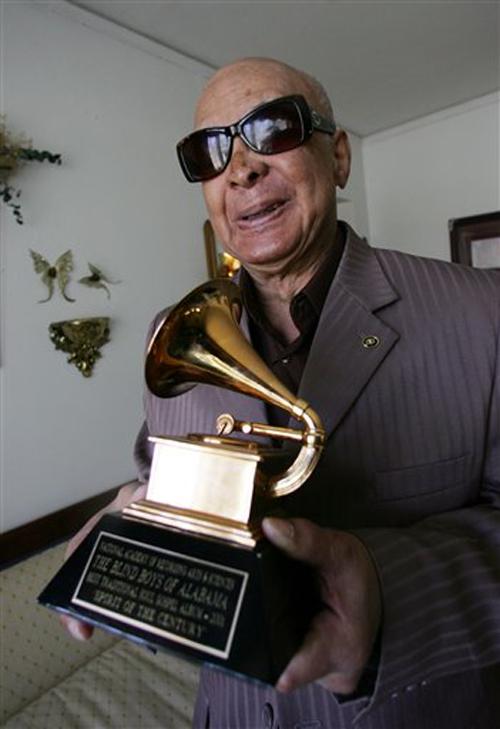Blind Boys of Alabama make first return to school where group formed
March 5, 2008
TALLADEGA, Ala. – Nearly 70 years later, Jimmy Carter – the last active, original member of the Grammy-winning Blind Boys of Alabama – still gets emotional talking about the day his mother dropped him off at age 7 to live at the state-run school for the deaf and blind.
Sightless since birth, Carter was thrust into a harsh, unfamiliar world far from his home in Birmingham. He was supposed to learn a trade like caning chairs or making brooms, but Carter wanted to sing. So did some of his new friends – and they eventually became the Blind Boys of Alabama.
The acclaimed gospel group is once again getting ready for the road after returning to the Alabama Institute for Deaf and Blind to perform there for the first time in more than six decades.
The Blind Boys were the headliners at a gala Friday night homecoming that marked the 150th anniversary of the institute, which provides free education, job training, Braille books and other services.
Carter, his expressive tenor voice turned gravelly after decades on stage, said it was good to go back after so long despite those terrifying first days as a student in 1939, when his mother left him, both of them in tears.
Get The Daily Illini in your inbox!
“It made me what I am today,” said Carter, speaking during an interview at his home in Montgomery before the show. “When the blind children wanted an education, that’s where they came. That’s how I met with the other singers.”
The president of the Institute for Deaf and Blind, Terry Graham, said the Blind Boys’ journey since leaving the east Alabama campus has been remarkable. They have played all over the world, with an appearance at the White House and a stint on Broadway.
“We are so pleased and honored that they would be with us because they are so well known internationally,” said Graham. “They are coming back as our most famous graduates.”
With about 300 students on its main campus and another 13,000 people served at nine regional centers around the state, the school today provides assistance for everyone from disabled newborns to elderly people who are going deaf or blind.
It was very different during Carter’s days at the school. The campus was segregated by race – like everything else in the Jim Crow South – and separate wasn’t always equal at the Alabama School for Negro Deaf and Blind, as the black division was called.
“The school really wasn’t up to par. It didn’t really seem like a school, it seemed like a reform school because they would lock you up at night, and they wouldn’t feed you,” said Carter.
Carter joined the choir as a boy, and that led to a gospel group modeled after the members’ idols, the Golden Gate Quartet.
“We didn’t have a radio, so we’d have to sneak off the campus to listen to them,” he said. “We decided if they could make a living, why don’t we try to?'”
The group left school and went on the road as The Happy Land Jubliee Singers on a date etched in Carter’s memory: June 10, 1944. Members never returned to the school for a show; they later adopted their current name.
The group that once sang to all-black audiences in the South made it to Broadway with the play “The Gospel at Colonus” in 1983, and they won four straight Grammys for traditional gospel groups. They have recorded more than 50 albums.
A gospel music expert said the Blind Boys have succeeded in opening up the genre to a new audience by working with people like rocker Peter Gabriel, who had them along as an opening act on his international tour a few years ago.
“The really cool thing about the Blind Boys is that they have done something that you could never do on paper: That is making 70-, 80-year-old men exciting to 20- and 30-year-olds,” said Bil Carpenter, author of “Uncloudy Days: The Gospel Music Encyclopedia.”
The group opens its 2008 tour Friday in Los Angeles. Four nights later they are scheduled to appear on NBC’s “Tonight” show, Carter said. By any measure, that’s a long way from school for the blind in Alabama.
The Blind Boys have had personnel changes through the years, but there has always been a mix of blind singers and seeing musicians. On stage, everyone wears matching suits and the sunglasses favored by the blind members.
The Blind Boys performed nothing but traditional gospel for years, but they moved into the mainstream in 2001 with the release of “Spirit of the Century,” which included the Rolling Stones’ “Just Wanna See His Face” and won the first of the group’s four consecutive Grammys.
Their new CD, “Down in New Orleans,” features musicians including the Preservation Hall Jazz Band. The New Orleans groove was new to the Blind Boys, but Carter said members wanted to branch out and lift up the city after Hurricane Katrina.
“We try to bring hope where there is despair. We try to bring peace where there is confusion. We try to bring love where there is despondency,” he said.







